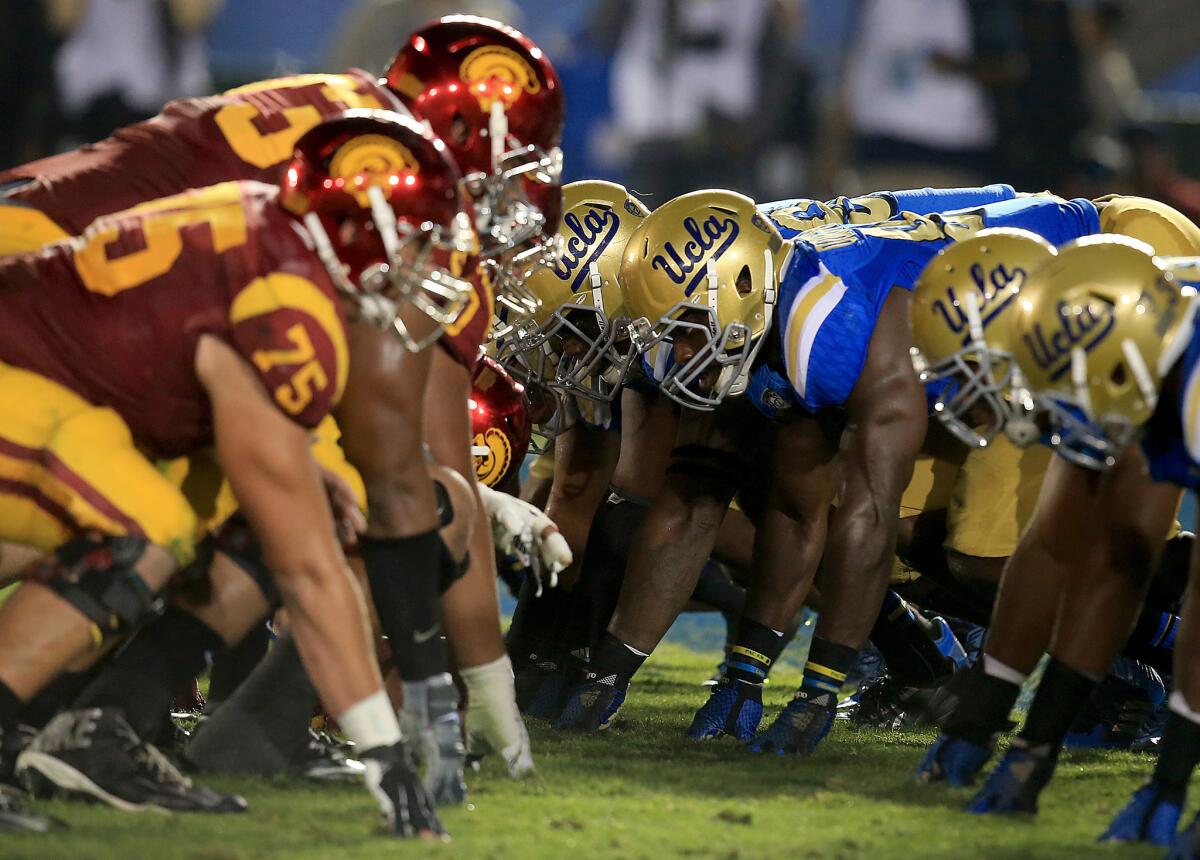Editorial: California wants to help college athletes get paid. It’s about time someone stood up to the NCAA

- Share via
College athletes are required by their schools and leagues to be amateurs, which makes them the only ones not earning money off the vast number of hours they put into honing their craft. In fact, a multi-billion-dollar industry has grown up around collegiate athletics in the United States, thanks to a vast marketing and monetization apparatus that turns the games and their players into lucrative sources of revenue.
Making matters worse, student athletes are forced to make a sacrifice no other celebrated Californian has to make: They must give up their right to strike licensing deals for the commercial use of their name, image or likeness. While their schools are free to sign highly profitable endorsements with the makers of athletic gear and sports drinks and video games, some of which rely on their students’ images and likenesses, the athletes who give their schools cachet and marketability are not.
It’s one thing to bar schools from paying athletes so as to preserve at least some pretense of amateurism; it’s another to say that schools can exploit their students’ names and images, but their students can’t.
That limitation strikes California lawmakers from both parties as fundamentally unfair, and they’ve voted overwhelmingly in favor of a bill (Senate Bill 206) by Sen. Nancy Skinner (D-Berkeley) to end it. The measure picks a fight with colleges, the Pac-12 Conference and the National Collegiate Athletic Assn., all of which bar students from striking endorsement deals. But it’s a fight worth starting.
Skinner’s proposal would require four-year colleges and universities to let students in California sell the rights to their names, images or likenesses. It would also forbid intercollegiate sports organizations to penalize students or the colleges they attend if they struck such deals or hired an agent or lawyer to help them negotiate — a prohibition that would almost certainly be tested in court by collegiate athletic organizations whose members are spread over multiple states.
The measure would inevitably eat away at the distinction between professional and college sports. Celebrated collegians could make money not only by endorsing sneakers and sports drinks, but also by autographing jerseys, pitching workout videos and putting their name on baseball bats and hockey sticks. In short, they could profit from the fame that their work as an athlete brings.
Yet an important distinction would remain: Students would not be paid by universities to play. They could receive scholarships that cover the cost of their education, but couldn’t draw any share of the profits generated when their team fills the Rose Bowl with 90,000 fans. They would still be toiling largely for someone else’s benefit.
It’s worth remembering that the vast majority of student athletes gain no renown and won’t turn pro after they leave school. Many of them are in sports that don’t even have that option. Their teams may cost their colleges more to operate than they produce in revenue.
Skinner’s bill isn’t aimed at them. Its main effect will be on athletes in the high-profile college sports who serve as cogs in the profit-generating machine. The demands on those athletes are enormous; being a member of a major college team can require as many hours of practice, preparation, travel and performance as a full-time job. And not only is the prospect of a pro contract uncertain, these athletes run the risk of career-ending injuries with no workers-compensation safety net.
The UC system and other intercollegiate groups have pushed back hard against the bill. They warn that their teams and students could lose eligibility to participate in championship games and tournaments for violating the NCAA’s clear rules against endorsement deals, and that the colleges themselves could lose the sponsorship revenue they use to support teams and pursuits that don’t make money. Even though Skinner’s bill wouldn’t go into effect until 2023, it would have implications immediately for recruiting. Perversely, it could discourage talented athletes from going to school in California for fear of their team losing eligibility to compete in tournaments.
Those are legitimate concerns, but they don’t justify maintaining a system that’s exploitative. An NCAA committee is exploring what to do about athletes’ names, images and likenesses, in light of court rulings about videogame licensing that have opened the door to greater student compensation. Ideally, other states would follow California’s lead, if for no other reason than to level the playing field and give their student athletes the same benefits California wants to give ours. In the meantime, though, California should move ahead and give student athletes the same rights every other Californian enjoys.
More to Read
A cure for the common opinion
Get thought-provoking perspectives with our weekly newsletter.
You may occasionally receive promotional content from the Los Angeles Times.










